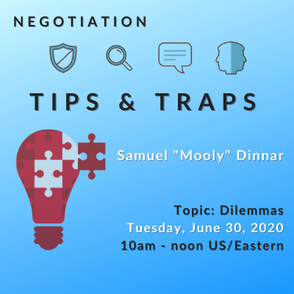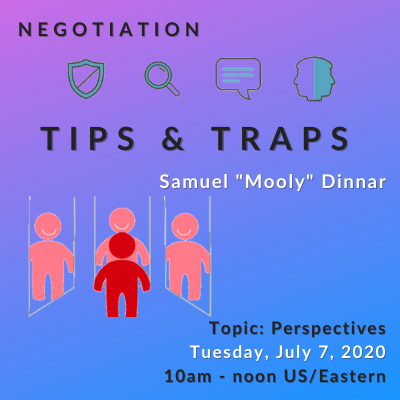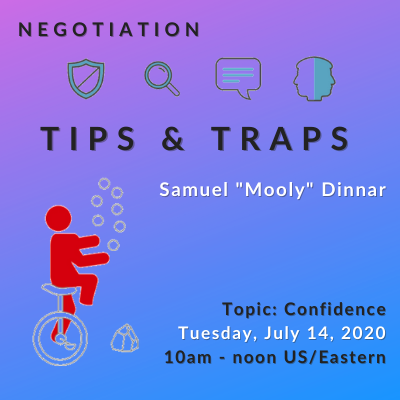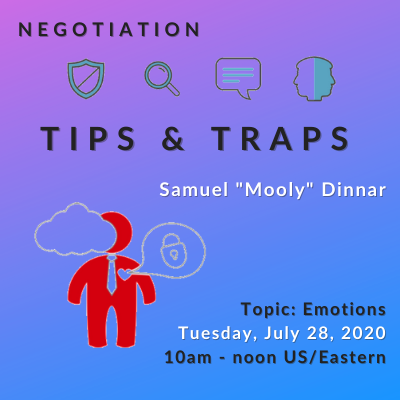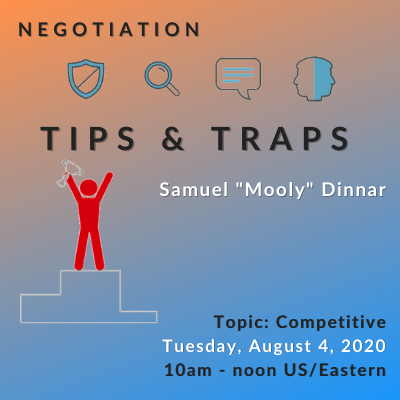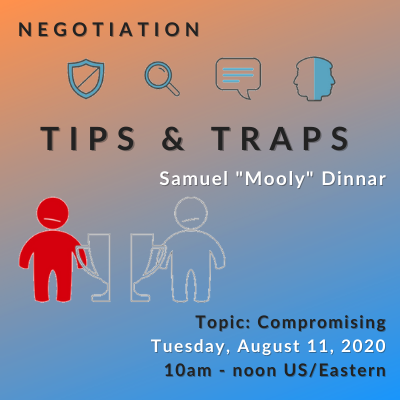Negotiation Tips & Traps
|
Thanks to all who attended! To be notified of upcoming events, please join our mailing list.
Weekly Online Sessions with Samuel "Mooly" Dinnar
June 30th - August 25th, 2020 Tuesdays, 10AM US/Eastern What You’ll Learn:
|
|
Each session is independent. Take one, or attend them all!
There are no prerequisites or required preparation work for these interactive discussion sessions.
There are no prerequisites or required preparation work for these interactive discussion sessions.
SCHEDULE
|
Dilemmas
Negotiators face several dilemmas when developing their strategy and responding to deal dynamics. Should they share information or keep their cards close to their chest? Should they make the first offer, or let the other side speak first? Should they focus on the most important issues or consider other agenda items that the other side proposes? Should they negotiate directly, or play hard to get? Should they emphasize creating value for everyone or claiming more value for themselves? Learn the theory and practical tips to improve your skills, tactics and strategy. Learn how to increase your awareness to prevent, detect, and respond to these common negotiation mistakes. |
Negotiation Tips & Inner-Actional Traps
|
Perspectives
Because negotiators are often deeply focused on their own interests, they may fail to recognize the needs and priorities of those with whom they have to interact. This focus on their own desires can blind negotiators to clues that could lead to better outcomes for both sides, an important goal when building working relationships. Learn the theory and practical tips to improve your skills, tactics and strategy. Learn how to increase your awareness to prevent, detect, and respond to these common negotiation mistakes. |
|
Confidence
Most good negotiators are confident. Trust (which is different than rapport) is a critical consideration in negotiation. Negotiation requires confidence in the other side and in the negotiation process. Some negotiators have too much confidence in their own abilities or situation. They may believe strongly that they will be successful despite indications to the contrary, and this may cause them to fail in incorporating appropriate contingencies into the agreements they sign. Learn the theory and practical tips to improve your skills, tactics and strategy. Learn how to increase your awareness to prevent, detect, and respond to these common negotiation mistakes. |
|
Discipline
Negotiation requires self-discipline and following proven best practices. Many negotiators rely on their instincts when a negotiation doesn’t go as planned. But when trusting their instincts, they are not as reflective on what they are doing and why. So, they end up blaming the other side when things to wrong. Worse, these same problems keep occurring because they fail to learn the right things from their experiences. Learn the theory and practical tips to improve your skills, tactics and strategy. Learn how to increase your awareness to prevent, detect, and respond to these common negotiation mistakes. |
|
Emotions
Logical problem requires separating the people from the problem. But emotions are a part of every negotiation. Most negotiators have a strong sense of what is fair. When they feel they are being mistreated, they fall prey to a slew of emotional mistakes, or cognitive biases, that allow ego to overrule logic. This can be especially problematic for negotiators who tend to deny the relevance of emotions (and ego) in negotiation. While claiming “it is just business,” they can overvalue formal power, leverage, and control and undervalue the more subjective side of negotiations. Learn the theory and practical tips to improve your skills, tactics and strategy. Learn how to increase your awareness to prevent, detect, and respond to these common negotiation mistakes. |
Negotiation Tips & Inter-Actional Traps
|
Competitive
The primary objective of many negotiators is to win. But how does one define winning? Is it ending up better than the other side? Many negotiators may become primarily concerned about besting their counterpart and thus treat negotiations as one-off interactions, disregarding the possibility that future deals might be even more valuable than whatever is on the table at present. Learn the theory and practical tips to improve your skills, tactics and strategy. Learn how to increase your awareness to prevent, detect, and respond to these common negotiation mistakes. |
|
Compromising
People who are tasked with negotiating may feel uncomfortable bargaining or may focus on getting other things done (such as engineering, research, operations). They feel compelled to decide quickly and “move on.” Instead of exploring additional options and finding even more advantageous trades, they settle for quick (and minimally acceptable) solutions. Learn the theory and practical tips to improve your skills, tactics and strategy. Learn how to increase your awareness to prevent, detect, and respond to these common negotiation mistakes. |
|
Teamwork
Negotiation is a team activity. When negotiators let their independent spirit dominate the way they negotiate, they prepare alone (rather than consulting their stakeholders and advisors), misread unfamiliar signals, take unreasonable stands, or vent emotionally at inopportune times. They fail to recognize that negotiation is an organizational, not an individual, task. Learn the theory and practical tips to improve your skills, tactics and strategy. Learn how to increase your awareness to prevent, detect, and respond to these common negotiation mistakes. |
|
Combative
Everyone enjoys being right on things, experiencing a “win”, and doing the right thing for their company or themselves. But too often negotiators get “tunnel vision” on only one metric of success. They may assume that they are only being measured by one parameter, such as price. This may lead them to take a series of aggressive positions along this one dimension, forgetting to consider other factors that can create significant value. How do you deal when this happens to you? How do you deal when you encounter such a “difficult” combative counterpart? Learn the theory and practical tips to improve your skills, tactics and strategy. Learn how to increase your awareness to prevent, detect, and respond to these common negotiation mistakes. |


